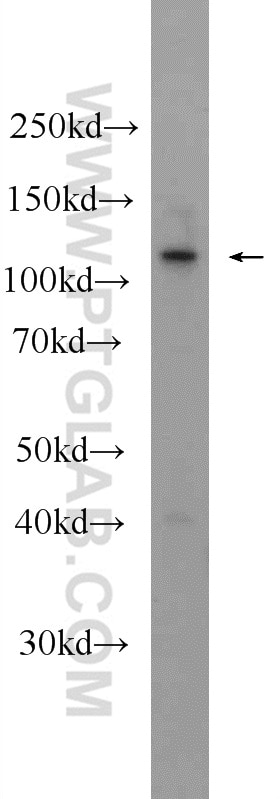Tested Applications
| Positive WB detected in | HEK-293 cells, rat colon tissue, mouse colon tissue |
Recommended dilution
| Application | Dilution |
|---|---|
| Western Blot (WB) | WB : 1:500-1:1000 |
| It is recommended that this reagent should be titrated in each testing system to obtain optimal results. | |
| Sample-dependent, Check data in validation data gallery. | |
Product Information
24880-1-AP targets KIAA1217 in WB, ELISA applications and shows reactivity with human, mouse, rat samples.
| Tested Reactivity | human, mouse, rat |
| Host / Isotype | Rabbit / IgG |
| Class | Polyclonal |
| Type | Antibody |
| Immunogen |
CatNo: Ag19367 Product name: Recombinant human KIAA1217 protein Source: e coli.-derived, PET28a Tag: 6*His Domain: 534-852 aa of BC018764 Sequence: PAQNLPHVASSPAVPQEATSTLQMSQAPQSPQIPMNGSAMQSLFIEEIHSVSAKNRAVSIEKAEKKWEEKRQNLDHYNGKEFEKLLEEAQANIMKSIPNLEMPPATGPLPRGDAPVDKVELSEDSPNSEQDLEKLGGKSPPPPPPPPRRSYLPGSGLTTTRSGDVVYTGRKENITAKASSEDAGPSPQTRATKYPAEEPASAWTPSPPPVTTSSSKDEEEEEEEGDKIMAELQAFQKCSFMDVNSNSHAEPSRADSHVKDTRSGATVPPKEKKNLEFFHEDVRKSDVEYENGPQMEFQKGSSGAPQTSRMPVPMSAKNR Predict reactive species |
| Full Name | KIAA1217 |
| Calculated Molecular Weight | 1943 aa, 214 kDa |
| Observed Molecular Weight | 100-110 kDa, 140-160 kDa, 210 kDa |
| GenBank Accession Number | BC018764 |
| Gene Symbol | KIAA1217 |
| Gene ID (NCBI) | 56243 |
| RRID | AB_2879775 |
| Conjugate | Unconjugated |
| Form | Liquid |
| Purification Method | Antigen affinity purification |
| UNIPROT ID | Q5T5P2 |
| Storage Buffer | PBS with 0.02% sodium azide and 50% glycerol, pH 7.3. |
| Storage Conditions | Store at -20°C. Stable for one year after shipment. Aliquoting is unnecessary for -20oC storage. 20ul sizes contain 0.1% BSA. |
Background Information
KIAA1217, sickle tail protein homolog, is required for normal development of intervertebral disks. It promotes epithelial-mesenchymal transition and hepatocellular carcinoma metastasis by interacting with and activating STAT3, indicating its potential as a therapeutic target for curbing HCC metastasis (PMID: 35008530). It is also a novel candidate gene associated with isolated and syndromic vertebral malformations (PMID: 32369272). KIAA1217 has 9 alternatively spliced isoforms of 100-110 kDa, 140-160 kDa, 210 kDa.
Protocols
| Product Specific Protocols | |
|---|---|
| WB protocol for KIAA1217 antibody 24880-1-AP | Download protocol |
| Standard Protocols | |
|---|---|
| Click here to view our Standard Protocols |










